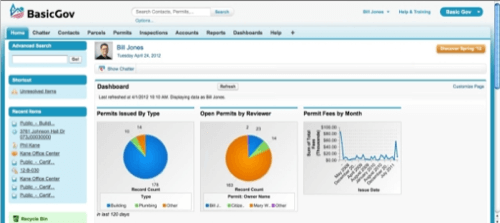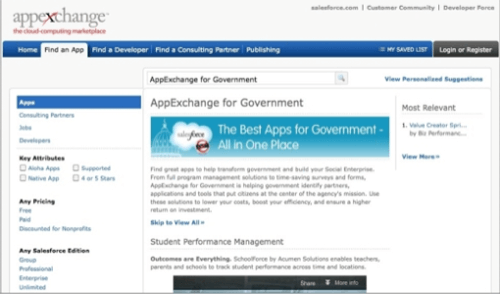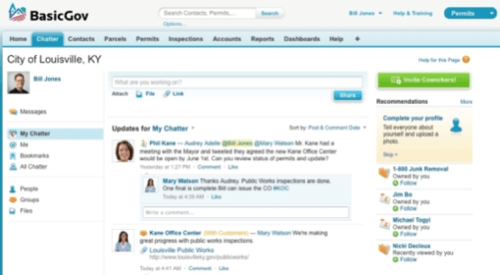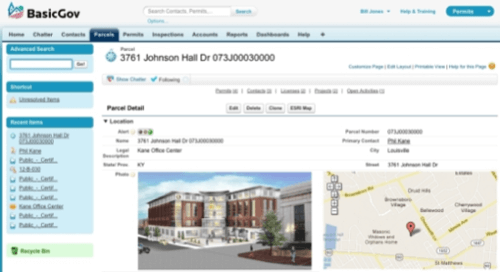
Public sector technology workers can only look with envy on what Salesforce and its Force.com apps have been able to achieve in commercial enterprises.Even as more and more enterprises eagerly move to the new social apps model, public sector IT functions remain solidly stuck in the 20th century, if not the 19th.
Salesforce is hoping that the excitement of the rollout of its dedicated Government Cloud in for Q3 2012 will sweep federal and state governments into adoption of newer, more collaborative, less expensive software. But when it comes to public sector IT, the image that springs to mind is “unstoppable force meets immovable object.”
The Government Cloud
“It’s a computing platform that government can embrace to transform for the social era,” says Dan Burton, Salesforce’s senior vice president for the global public sector, in an interview with ReadWriteWeb.“There’s no IT infrastructure to buy, no data centers to build, no upgrade and maintenance fees to pay – just citizen access to government services anytime, anywhere, at Internet scale.”
Well, at least that’s the goal.Certainly Salesforce has demonstrated the ability to develop and produce this kind of product, and there may be state and local governments ready to make the leap.For the federal government, though, the leap may be a chasm – one with a few big legislative hurdles in the way.
It’s not that the feds don’t realize that fundamental shifts are necessary in the nation’s IT infrastructure. But the necessary mindset shift from the skillsets that federal IT relies upon today and, say, Force.com truly does require a revolution. Plus, with government job security as high as it’s ever been, any change in the way the U.S. Goverment does business will require the retraining of thousands of workers.
Exclusive Databases
Burton (no relation to the Indiana congressman) tells RWW that Government Cloud will be comprised of exclusive databases separate from its enterprise products. Its foundation will be housed in Salesforce.com’s U.S. production data centers, and will utilize software access controls whose security that have already been declared compliant with FISMA and ISO/IEC 27001. “The dedicated government instance will offer the same high level of security and trust that Salesforce is known for,” Burton claims.

Along with the dedicated Government Cloud instance will be a dedicated App Exchange, which Salesforce expects to be populated with apps that can be readily downloaded and installed out of petty cash – hopefully avoiding the months-long procurement process and competitive bidding arrangements to which governments are presently accustomed.

As an example, Burton used Salesforce Chatter to enable an ordinary citizen to look up information about a building permit, and let a government worker get back to him with downloadable documents, picture, and details.The worker is assigned the citizen just like the salesperson is assigned the customer.It’s a case the worker can follow up on using social media. You can only imagine how enticing this example must look to workers chained to a pre-Y2K environment.

Just the prospects of open collaboration alone, Salesforce’s Burton believes, could transform government into something more like CEO Marc Benioff’s “social enterprise.”
“If you think of government today, there are over 3,000 counties, thousands of cities, 50 states, hundreds of federal agencies, and each one is buying and building custom applications with little knowledge of what other government agencies are doing,” Burton says.“And AppExchange for government will eliminate this duplication by creating an online marketplace that lets government find and deploy applications with a click of a mouse.It’s built on Force.com, it has gone through security reviews, it’s 100% cloud, and it’s available today.We already have 60 applications from more than 30 partners, and more on the way.”
Will the Revolution Be Televised or Postponed?
Done right, this approach could revolutionize citizens’ everyday interaction with their local, state, and federal government offices. Revolutions are not things that governments tend to embrace with open arms (especially when there’s money behind them), but Salesforce is openly positioning itself as a force for disrupting government bureaucracy and protocol.
“Salesforce is all about disruption and transformation,” proclaims Burton.“We are very conscious about that.We think that legacy IT systems are broken, and to have government spend money on IT infrastructure, databases, maintenance and upgrade fees, is holding government captive and not allowing it to deliver the social, mobile, and open technologies that citizens already have and are demanding from government.I think that this revolution will take place faster than people think.”
Salesforce’s announcement today kicks off the company’s Cloudforce D.C. conference.

















